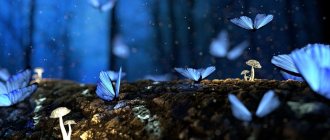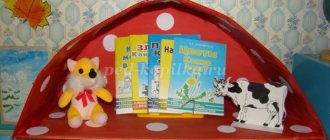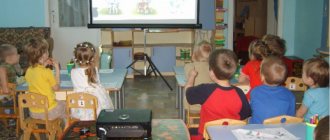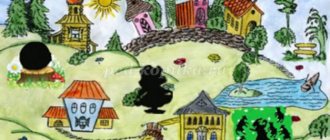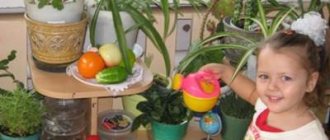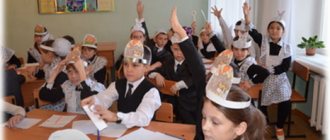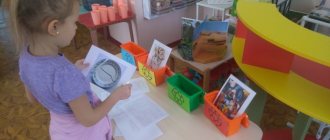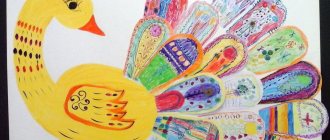Ekolyata - young conservationists
REGULATIONS on the environmental socio-educational project “Ekolyata” for the formation of ecological culture and a culture of love for nature among students of general education organizations implementing educational programs of primary general education (grades 1 – 4)
Relevance of the Project
President of the Russian Federation V.V. Putin announced the implementation of the national idea of uniting the peoples of our multinational country. “I am a citizen of Russia,” this, according to him, should be the slogan of this idea.
One of the directions for the development of the state and the unification of a multinational society is the patriotic education of the younger generation. This is one of the priority areas in the Russian education system, contributing to the formation of patriotic consciousness in the younger generation, readiness to fulfill civic duty, and the most important constitutional responsibilities to protect the interests of the Motherland.
A manifestation of patriotism is also love for the nature of one’s small homeland, attention, care and respect for its animal and plant world. These feelings can be developed in the process of comprehensive environmental education of the younger generation, the ultimate goal of which is to form a person with new ecological thinking, capable of realizing the consequences of his actions in relation to the environment, and able to live in harmony with nature. It is nature that plays an important role in instilling love for the Motherland.
Nature is one of the most important factors in folk pedagogy. She is not only a habitat, but also a native side, the Motherland. Therefore, in the process of getting to know the nature of their region, the child develops a love for every object in nature, which in turn contributes to solving environmental problems.
In this context, the essence of one of the directions of patriotic education is to sow and cultivate in the soul of a child and teenager the seeds of love for the native nature, for the native home and family, for the history and culture of the country, created by the labors of relatives and friends, those whom called compatriots.
To do this, an ideology must be developed that allows the child to develop a culture of love for nature, love for the nature of his native land, and, therefore, love for the state.
Fostering a love for nature, its flora and fauna must be carried out constantly, because the formation of an attitude towards the country and state where a person lives begins in childhood.
A change in a child’s consciousness can affect the nature of his future relationships with the natural environment. It should be noted that children are more strongly influenced by emotions, personal experience and an authoritarian example.
The formation of an ecological culture and a culture of love for nature in children should be continued in general education organizations.
To solve this organizational problem, at each stage of environmental education and upbringing, new innovative tools, programs, projects, forms, methods, approaches, techniques, solutions, technologies and activities are needed.
One of such tools for environmental education and education of children in primary schools, as part of the patriotic education of a child, can be the new environmental socio-educational project “Ekolyata” to develop an ecological culture and a culture of love for nature among primary school students in Russian regions.
The “Ekolyata” project is the next stage of the overall process of forming a child’s environmental culture after the “Ekolyata – Preschool” project (preschool educational organizations).
In grades 5-9 and 10-11, the process of environmental education and upbringing will be implemented within the framework of the environmental socio-educational project “Young Defenders of Nature”.
The environmental socio-educational project “Ekolyata” (hereinafter referred to as the Project) is a new innovative tool for the development of additional education with an environmental and biological focus in primary schools in Russian regions.
Objective of the project
Formation in the student of a rich inner world and a system of value relations to nature, its animal and plant world, development of the internal need of love for nature and, as a result, careful attitude towards it, nurturing a culture of love for nature.
Project Objectives
• give students of general education organizations knowledge about the Nature around them, introduce them to the diversity of the flora and fauna of their small homeland, show the uniqueness, greatness, strength and beauty of Nature; • promote the development of understanding of the indivisible unity of man and Nature, understanding of the universal human value of Nature; • help to realize the need to preserve, protect and save Nature for the survival of Man himself on earth; • expand your general horizons, promote the development of creative abilities; • help self-determination in building relationships with Nature and the world around him; • develop and introduce into the educational process of general education organizations new innovative tools, forms, methods, approaches and techniques that can create a feeling of love, a diverse value, careful and respectful attitude towards Nature; • promote the need to take an active part in environmental and environmental activities.
Project Contents
Within the framework of the Project, using the images of fairy-tale heroes “Ecolyats” - friends and defenders of Nature, a variety of activities are provided that contribute to the formation of an ecological culture and a culture of love for nature, the assimilation of theoretical ecological-biological, geographical and other special knowledge and skills, as well as the fundamentals of communicative, speech and general culture.
In the first grade of a general education organization, the student is awarded a special Badge and Certificate “Eco-Children”. At this time, the child understands that he takes on the responsibility to protect nature, become its friend, and come to its aid.
The second official document - a Diploma, indicating that the student, based on the results of work from grades 1 to 4 in the field of nature conservation, has become a real “Eco-Kid”, is issued to a child in the 4th grade.
A special feature of the “Ekolyata” Project for the formation of a culture of love for nature among students is its focus on the spiritual, moral, aesthetic education of children, creating the necessary conditions for the development of a harmonious personality in a child using the fairy-tale heroes “Ekolyata” - friends and defenders of Nature.
The culture of love for nature is understood as the sphere of spiritual culture, organization and development of life activities, ensuring the preservation and enrichment of the positive experience of knowledge and interaction between man and nature, accumulated in the process of natural and social development.
The project is a complex of classes, tasks and events, educational and teaching aids, thematic books, games, audio, video and other products, subordinated to the goals of instilling in children love, a careful and respectful attitude towards Nature.
Recently, many books, textbooks, teaching aids, as well as proprietary programs on the education of environmentally literate behavior and environmental protection have been developed for children. Their main drawback is insufficient attention to nurturing the child’s spiritual culture through nature. Without an emotional component, the rules of behavior towards nature will remain just rules from a textbook.
Thematic classes are conducted with students of general education organizations that comprehensively contribute to the formation of a culture of love for nature, the awareness that they can become true friends of nature.
Particular attention in the Project is paid to the formation of a holistic view of the surrounding nature. At the same time, man is seen as an integral part of nature. It obeys the laws of its development, and the state of the natural environment depends on its activity.
Love of nature helps to realize that each person is an individual, on whose activities the fate of future generations depends. Great importance is given to the development of ideas about the importance and value of the natural environment.
The use of the theory of complex systems and a systematic approach to the study of Nature and the surrounding world involves the interpenetration of various types of activities in the educational process, such as observation, conversation, reading and listening to fairy tales and stories, completing tasks, playing, conducting experiments, walking, conducting classes on nature, work on an experimental site around preschool educational organizations, drawing, etc. and occurs at the level of formation of images, ideas and various concepts in the world of Nature. At the same time, it is important that during the lesson there should not be a mechanical memorization of what was heard and seen, but a real analysis of what is happening and, based on this, making a real decision in one’s future activities.
The project focuses the teacher’s activities on a systematic approach to the development of a culture of love for nature. At the same time, the Project uses the principle of consistency, continuity and development. All of its constituent topics and sections are related to each other, and each subsequent topic considered in the Project is based on previously studied materials.
An integrative approach to teaching and upbringing makes it possible to combine in the educational process purposeful activities indoors and outdoors, reading books, participating in games, holding holidays, competitions, quizzes and events, going to a park or forest, conducting observations and experiments, participating in practical activities with adults.
For each age group of students, their own sets of classes are compiled, which makes it possible to present the educational process as holistic and developing.
The classes conducted within the framework of the Project can be used independently or included in existing programs for the environmental, moral, cultural and aesthetic education of a child.
The project is an integral part of the system of additional education for students with an ecological and biological orientation.
Predicted results:
• formation in students of the foundations of ecological culture and a culture of love for nature; • improving general culture; • formation of a spiritually rich inner world and a system of value relations to the natural environment; • development of the internal need for love of nature, participation in environmental and environmental activities; • expanding the general horizons of students, developing their creative abilities.
The objectives of the Project are solved by:
• creation and implementation, using the images of fairy-tale heroes “Ecolyats” - friends and defenders of Nature, of new techniques, forms, methods and approaches aimed at instilling in students a culture of love of nature, careful and respectful attitude towards the animal and plant world, responsibility for their conservation, formation a holistic view of Nature, development of environmentally literate behavior skills; • providing the student with the opportunity to be a direct participant in all activities carried out during the educational process and aimed at preserving nature; • an integrated approach to the problem of environmental, moral, cultural and spiritual upbringing and education; • creation of the necessary methodological and methodological base within the framework of the Project; • introducing into the educational process ideas and proposals of students on protecting the natural environment, protecting flora and fauna, and solving environmental problems; • providing students with the opportunity to communicate with their peers from other preschool educational organizations on various topics and areas of this Project.
The organization of the educational process within the framework of the Project, as well as the conduct of all events, can be carried out on the territory of a general education organization in any region of the Russian Federation.
All products developed and produced within the framework of the Project, as well as the activities carried out, are interconnected, are elements of one general concept for the implementation of the educational process, complement and develop each other, correspond to the goals and objectives of the Project and together allow us to solve the problem of creating a culture of environmentalism among students.
The executive structures for the development of the Ecolate Project are the Interregional public organization for promoting the preservation of the natural heritage of the regions “Natural Heritage of the Nation” and the federal state budgetary educational institution of additional education for children “Federal Children's Ecological and Biological Center”.
Within the framework of the Project, program and organizational committees, thematic sections and working groups are created.
The Ecolyata project is based on:
• application in the process of raising a culture of love for nature, as well as in the process of environmental, environmental, moral, spiritual and aesthetic education and education of a child, elements and methods of a systematic approach and analysis, systematization and classification of knowledge; • consideration of the entire set of components and elements of the educational and educational process of a general education organization, aimed at developing a culture of love for nature among students, solving problems of environmental, environmental, moral, spiritual and aesthetic education, as a single, comprehensive and systemic educational toolkit; • the use of images of fairy-tale heroes “Ecolyats” - friends and defenders of Nature - in the educational process of general education organizations; • inclusion of interstructural connections in the educational process as part of the study of various topics in the textbook “The ABC of Nature Love”; • organization and implementation of classes and events within the framework of the Project using the textbook “The ABC of Nature Love”, books, games, audio, video and other products using the images of fairy-tale characters “Ekolyat” - friends and defenders of Nature; • introducing elements of bibliotherapy and complex fairy tale therapy into the educational process with the help of a series of educational fairy tales, such as “The Living Alphabet”, as well as other fairy tales and various stories about the animal and plant world, helping to educate the child in a culture of love for nature; • the presence of various game elements and programs during the study of a particular topic or issue; • inclusion in the educational process of a variety of activities and various tasks on the topics, areas and issues being studied; • providing students with the opportunity to further study this or that material with teachers, parents and their peers outside the general education organization.
The “Ekolyata” project, with the aim of developing a culture of love for nature in primary school children, provides for:
• use of the textbook “The ABC of Nature Love” in general education organizations; • creation of an educational and methodological base for organizing and conducting classes in various areas and topics of the textbook “The ABC of Nature Love”; • use of images of fairy-tale heroes “Ekolyat” – friends and defenders of Nature – in the educational process of general education organizations; • creation of sets of educational and teaching aids, handouts and visual materials; • development and publication of gaming, educational and educational books and magazines aimed at achieving the goals and objectives of the Project; • development and release of board, floor, and computer games, as well as audio and video products based on the themes and areas of the Project, using the images of fairy-tale characters “Ekolyat” - friends and defenders of Nature; • creation of a variety of gaming complexes and programs for general education organizations, as well as for organizing activities in the family; • development of special elements for the design of premises in educational institutions; • organizing and conducting various game programs, competitions and quizzes, and other similar events; • publication of anthologies and various anthology collections; • creation and opening of pages, sections, headings, topics, information strips of the Project in newspapers, magazines, radio and television programs; • organizing and conducting practical classes on the protection and protection of Nature; • organizing and conducting various thematic meetings, excursions and other events that are an integral part and elements of the educational process in a general education organization; • creation of experimental sites, use of territories adjacent to general education organizations to conduct classes with students within the framework of the Project; • use in the educational process of elements of natural and artificial natural areas with their flora and fauna.
The “Ekolyata” project allows for comprehensive education and upbringing of a child at school and in the family, aimed at developing a culture of love for nature among students.
Recommended principles of work that should be used when organizing and conducting classes within the framework of the Ecolate Project:
• a systematic approach to the consideration of any educational topic, issue and problem using elements of knowledge classification; • use of an integrating approach in the educational process; • consistency in training and education; • continuity in the consideration of the topics studied; • analysis of what is happening and taking into account the characteristics of the surrounding world and the factors influencing it; • simplicity and accessibility of the material being studied; • clarity when studying topics and questions; • the presence of elements of comparison and various examples in the educational process; • the presence of a practical demonstration, the possibility of setting up and conducting an experiment when studying a topic or any educational material; • search and application of the most effective methods, forms, approaches and techniques when conducting the educational process, as well as in classes and events organized and conducted within its framework; • voluntariness in the child’s consciousness and actions when studying an educational issue and topic; • safety in the organization and conduct of the educational process; • the presence of a conscious approach both in the elements of teaching a particular educational material on the part of the teacher, and in the elements of perception and cognition of this material on the part of the student.
Recommended forms of work used during the organization and conduct of the educational process within the framework of the Ecolyata Project:
• lesson; • thematic lesson; • reading; • conversation; • observation; • discussion; • listening to thematic fairy tales and stories; • exercise; • a game; • viewing fragments of a feature film, television, educational, popular science or documentary film; • viewing fragments of a television program; • watching a thematic animated film; • listening to radio broadcasts; • quiz; • contest; • thematic design of classrooms and premises; • meeting; • walk; • work in nature; • conducting the experiment; • excursion; • hike; • promotion; • thematic event.
Recommended tools for organizing work within the framework of the Ecolate Project:
• textbook “The ABC of Nature Love”; • textbooks and teaching aids; • various thematic books; • anthologies; • workbooks and diaries; • albums and coloring books; • visual and handout materials; • magazines and newspapers; • artistic, educational and popular science works; • encyclopedic and reference publications; • audio and video media; • board, floor, computer and other games, as well as game complexes and programs with the presence of fairy-tale heroes “Ekolyat” - friends and defenders of Nature; • costumes and images of fairy-tale heroes “Ekolyat” – friends and defenders of Nature; • elements of animation and filmstrip; • feature, television, educational, documentary, popular science and other films, their fragments and footage; • theatrical productions, their fragments and elements; • television programs, their fragments and elements; • museums and art galleries; • exhibitions, fairs and various thematic expositions; • experimental sites in schools, as well as adjacent areas; • elements of natural and artificial natural areas with their flora and fauna. • various events, holidays, Olympics, processions and promotions.
Recommended topics for classes on the EcoLyata Project (taking into account age characteristics):
• “Nature around us”; • “Diversity of Nature” (Beauty of Nature, Portraits of Nature, Secrets of Nature, Powers of Nature, Wealth of Nature); • "Seasons"; • "Times of Day"; • "Animals and plants"; • “Man is a piece of Nature. Unity of Man and Nature"; • “Man cannot live without Nature”; • “In Nature, like in Man, there are families and friends”; • “Nature is your friend! That means you can’t offend her!” • “Help Nature, help your friend!” • “Choose a friend, take care and look after him”; • “Save Nature from fire”; • “Let's not only love and respect, but also take care and protect Nature”; • “Love of nature is a textbook of our life.”
Recommended topics for classes in the textbook “The ABC of Nature Love” (taking into account age characteristics):
• Be careful with Nature • Take care of Nature • Be polite to Nature and attentive to Nature • Know how to walk in Nature • Be friends with Nature • Unity of Man and Nature • Feel sorry for Nature • Take care of Nature • Explore, study Nature • Red Book • Love Nature, admire Nature • Diversity of Nature • Observe Nature • Responsibility to Nature • Love of Nature • Rejoice with Nature • Preserve Nature • Work for the benefit of Nature • Respect Nature • Fantasize with Nature • Visit Nature • Value of Nature • Wonders of Nature • Whispers Nature • Bounty of Nature • Ecology • Young naturalist • Natural phenomena
Images of fairy-tale heroes “Ekolyat” – friends and defenders of nature
The images of fairy-tale heroes “ECOLYAT” are protected by a document of protection. The use of images and names of heroes is carried out only with the written permission of the patent holders.
Authors of fairy-tale characters “Ekolyat” – friends and conservationists
Zotov Vladimir Valentinovich , head of the All-Russian environmental social and educational projects “Ekolyata-Preschoolers”, “Ekolyata” and “Young Defenders of Nature”, co-chairman of the Council for the Preservation of the Natural Heritage of the Nation in the Federation Council, Deputy Executive Director for Development and Relations with Federal and Regional Bodies authorities of the Senatorial Club of the Federation Council, member of the interdepartmental Working Group on Environmental Education in the Russian Federation under the Russian Ministry of Natural Resources, children's writer, member of the Writers' Union of Russia, candidate of pedagogical sciences, academician of the International Academy of Sciences of Pedagogical Education and the International Pedagogical Academy, corresponding member of the Russian Academy of Natural Sciences Sciences (RAEN).
Zotova Tatyana Vladimirovna , co-director of environmental social and educational projects “Ekolyata-Preschoolers”, “Ekolyata” and “Young Defenders of Nature”, member of the Expert Coordination Council for the development of environmental and additional education in the constituent entities of the Russian Federation, candidate of pedagogical sciences, academician of the International Academy Sciences of Pedagogical Education, member of the Union of Journalists of Russia, author of the textbook “The ABC of Nature Love”.
The cheerful fairy-tale heroes of “Ecolyata” - friends and defenders of Nature - will help you make friends with Nature, understand and love it. They were born in the forest, they know everything or almost everything about it. They have many friends, acquaintances and acquaintances. Of course, like all children, they sometimes like to play pranks.
Naughty ©
Let's get to know them better. So, the most mischievous and mischievous, without a doubt, is Scamp. He loves funny games, of which there are a great many. He always strives to learn something new and unknown, his yellow cap with a protruding oak leaf constantly flashes here and there. To go with his bright hat, Shalun picked up blue shoes, gloves and a scarf.
Good girl ©
The most serious, perhaps, is Clever Girl in a pink hat, with two funny pigtails. She wears a green skirt, a green collar, yellow gloves, and dark pink shoes. The smart girl knows a lot and tells her friends interesting stories because she loves to read. No, no, just don’t think that she always does the right thing and knows the answers to all questions. It’s just that she’s the oldest of all the kids, and that explains everything.
Quiet ©
The younger acorn brother, who wears an orange cap, dark pink boots, green gloves and a collar of oak leaves of the same color, and a burgundy belt, is called Quiet. He is indeed quite quiet and modest, even rather shy. But this does not in the least prevent him from supporting his older brother, Scamp, in every possible way, not only in all his pranks, but also in useful deeds. Tikhonya also loves flowers very much, so he planted a wonderful flower garden in front of the heroes’ house.
Herringbone ©
The acorn babies have a friend - the cheerful and sociable Elochka. She wears a burgundy cap and matching shoes, yellow gloves and a small cone brooch on her dress. She often comes to visit the kids to play and talk about this and that.
All together, the heroes protect and protect the forest, take care of its inhabitants. They will help you get to know Nature better, make friends with it and love it.
PEDAGOGICAL PROJECT “Young Nature Defenders”
Should you always answer all your children's questions right away?
What did the mother contribute to by setting such a task?
Do you think it is possible to catch butterflies and other insects? What is brought up in children in this way?
What character traits can be developed in children by watching insects?
• Sasha, while helping his grandmother care for strawberries in the garden, became interested in how berries are made from flowers. The grandmother invited the boy to watch the formation of strawberry fruits. She drew her grandson’s attention to how the ovary appeared, how it began to grow, change in shape and color.
These observations, directed by the grandmother, enriched the child’s knowledge about the growth and development of strawberries. Based on this knowledge, Sasha was able to explain the process of formation of currant berries and cucumber fruits from flowers. He developed a rudimentary understanding of plant growth and development, which later helped him in studying botany at school.
Questions
Should young children be encouraged to observe and care for garden plants? What does this give?
Do you think that if a child takes part in labor activities together with adults in the vegetable garden and flower garden, will he be able to show cruelty towards plants and animals, people?
Do your children take part in caring for the plants in the garden?
3. Concert by children “Russian Nature”.
4. Discussion with parents of what was seen.
• Do they think that such work with children will contribute to instilling a love for the nature of their native land and a desire to protect it.
• Is it possible to treat nature as a means of nurturing beauty in a person?
“The most beautiful thing is nature itself. Look at it as closely as possible. First, take a flower, or a leaf, or a cobweb, or frost patterns on glass... All these are works of art by nature's greatest artist. Try to define in words what you like about them. This will force the attention to delve deeper into the observed object, to treat it more consciously when evaluating it, to delve deeper into its essence... Turn... to the study of everything that catches your eye and that helps to develop good taste and love for the beautiful.” (K. Stanislavsky)
5. Invite parents to think about what they can do together with their children to protect nature (specific activities in nature at the dacha, near the house, in kindergarten).
Appendix 5
Intellectual and creative game “In harmony with nature”
Leading.
Today we have an intellectual and creative game “In Harmony with Nature”. Kindergarten teachers and parents participate. On the table are cut parts of two postcards. I suggest everyone take parts of the postcards and make whole postcards from the parts. We formed two teams. Please have a meeting, come up with a team name and choose a captain.
